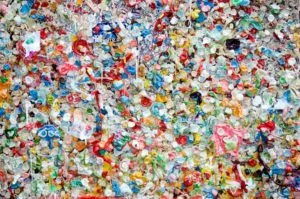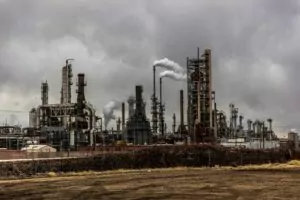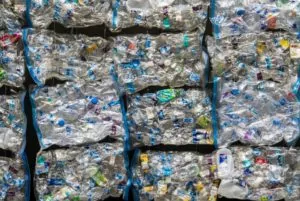The mark plastic is leaving on the planet is becoming clearer and clearer – we see it almost everywhere. Images across social media displaying the impact of plastic leave us with the reality that plastic is the least environmentally safe material. Many campaigns are raising awareness of the plastic crisis and the detrimental effects of this material. But why is plastic so much more harmful than alternative options? The answer lies in its lifecycle – we outline the process below.
 Plastics are a type of synthetic polymer. Chemists designed them to be a strong, flexible, and lightweight material for products. Synthetic, man-made polymers can be formed from natural substances such as cellulose, however, generally, they are made using carbon atoms in fossil fuels. Since we learned how to create and manipulate synthetic plastics almost 150 years ago, they have become a significant part of our daily lives. Most products have some type of plastic polymer.
Plastics are a type of synthetic polymer. Chemists designed them to be a strong, flexible, and lightweight material for products. Synthetic, man-made polymers can be formed from natural substances such as cellulose, however, generally, they are made using carbon atoms in fossil fuels. Since we learned how to create and manipulate synthetic plastics almost 150 years ago, they have become a significant part of our daily lives. Most products have some type of plastic polymer.
Step 1: Extraction
To create the plastic product, you first need to extract crude oil or methane gas. The main methods for these large-scale operations are mining and drilling. Mining involves digging to expose buried resources, it often results in large volumes of excess rock and soil being dumped in valleys in steams, impacting water flow and marine life. Extraction sites are generally left with damaged land and poor soil that is prone to events such as landslides and toxic water pollution. Unconventional extraction methods such as natural gas hydraulic fracturing or ‘fracking’ receive a significant amount of attention from environmental campaigners. Fracking depletes resources, contaminates wastewater, involves methane and toxic aerosol emissions, and increases the potential for earthquakes and oil spills.
 Step 2: Refinement and cracking
Step 2: Refinement and cracking
The raw materials are shopping to a refinery post-extraction. During refinement, the building blocks for plastic production are derived – propane from natural gas and ethane from crude oil. Ethane and propane are then broken down into ethylene and propylene at a cracking plant. Resins are produced through catalysed polymerisation, chemically modifying ethylene and polyethylene. Chemical processing can take place in different ways leading to different plastics. The number in a triangle on plastic products indicates the type of plastic. Resins are made into plastic pellets called ‘nurdles’ as they are under high temperature and pressure and then cooled. Manufacturers then use these pellets to create the plastic product they want from plastic bags to polystyrene.
Chemical additives that enhance or suppress chemical properties cause differences in the end products. Mismanagement or littering of plastic waste accumulates as marine debris in our oceans poses a significant eco-toxicological risk for marine species and humans.
Step 4: Distribution and consumption
Approximately 9.2 billion tonnes of plastic have been produced since 1950, and 40% of this is for single-use plastic products. Through our purchasing habits, we can the ability to urge companies to be more environmentally friendly and look into sustainable alternatives.
Step 5: Disposing of plastics
 Given the process, resources, and energy used to create plastic products, we must responsibly use and dispose of any we own. We can re-purpose, re-use, and up-cycle plastics to make the most of their use before we throw them away. For example, it can be as simple as saving an old toothbrush for cleaning. Hard plastics are often recycled in municipal recycling bins, whereas other plastics are slightly harder, and often require third-party entities such as your local grocery store. When plastics are recycled, they’re sorted, flaked, washed, and formed into new nurdles ready to become a new product.
Given the process, resources, and energy used to create plastic products, we must responsibly use and dispose of any we own. We can re-purpose, re-use, and up-cycle plastics to make the most of their use before we throw them away. For example, it can be as simple as saving an old toothbrush for cleaning. Hard plastics are often recycled in municipal recycling bins, whereas other plastics are slightly harder, and often require third-party entities such as your local grocery store. When plastics are recycled, they’re sorted, flaked, washed, and formed into new nurdles ready to become a new product.
Recycling may be the best way to manage existing plastic, and avoid further harmful extraction to create new plastic. However, it is not a long-term solution due to its energy-intensive process and logistical challenges. Additionally, plastics are not infinitely recyclable – each time plastic is processed its quality reduces.
As a society, we must move away from the use of plastics to minimise their production and the resulting harmful effects. Check out our blog on plastic swaps to discover how you can ditch plastic.






